
Anthropologie-International Journal of Human Diversity and Evolution
Scope & Guideline
Illuminating the Spectrum of Anthropological Research
Introduction
Aims and Scopes
- Biological Anthropology:
Research on human biological diversity, including studies on genetics, morphology, and health disparities among different populations. - Archaeological Anthropology:
Exploration of past human societies through archaeological findings, emphasizing cultural practices, burial rites, and material culture. - Ethnoarchaeology and Comparative Ethnology:
Analysis of contemporary societies to better understand past behaviors and cultural practices, enhancing the interpretation of archaeological data. - Paleopathology:
Investigation of ancient diseases and health conditions through skeletal remains, providing insights into the health status of past populations. - Anthropometric Studies:
Measurement and analysis of human physical characteristics to understand growth patterns, health, and nutritional status across different populations. - Interdisciplinary Approaches:
Utilization of various methodologies from genetics, archaeology, and cultural anthropology to provide a holistic understanding of human evolution and diversity.
Trending and Emerging
- Integration of Technology in Research:
An increasing number of studies utilize advanced technologies such as photogrammetry and MRI for anthropological research, indicating a trend towards more precise and technologically-enhanced methodologies. - Health and Disease in Historical Contexts:
There is a growing emphasis on understanding health and disease patterns in historical populations, particularly in relation to bioarchaeological findings, reflecting current global health concerns. - Genetic Studies and Human Variation:
Research on genetic diversity and its implications for understanding human evolution and health disparities is gaining prominence, highlighting the importance of genetics in anthropological research. - Impact of Environmental Stressors:
Emerging studies focus on the effects of environmental stressors on human health and development, aligning with global discussions on climate change and its impact on human populations. - Cultural Responses to Modern Challenges:
The exploration of how past societies adapted to challenges, such as pandemics or environmental changes, is increasingly relevant, paralleling contemporary societal responses to similar issues.
Declining or Waning
- Traditional Ethnographic Studies:
There has been a noticeable decrease in papers focusing solely on traditional ethnographic methods, possibly due to a growing emphasis on interdisciplinary approaches that integrate various methodologies. - Historical Analysis of Specific Cultures:
Research centered on the detailed historical analysis of specific cultures is less frequent, indicating a shift towards broader comparative studies or bioarchaeological investigations. - Focus on Western Populations:
Studies that predominantly focus on Western populations or contexts have diminished, suggesting a movement towards more inclusive research that values global diversity. - Single-Dimensional Health Studies:
Research focusing solely on one dimension of health (e.g., diet or exercise) without considering socio-cultural contexts appears to be declining, reflecting a growing recognition of the complexity of health issues.
Similar Journals

Intersecciones en Antropologia
Bridging gaps in anthropological scholarship.Intersecciones en Antropologia, published by the Universidad Nacional del Centro de la Provincia de Buenos Aires (UNICEN), Facultad de Ciencias Sociales, is a premier open-access journal in the field of anthropology, having established its presence since 2010. With an impressive impact factor and currently holding the distinguished Q1 quartile ranking in anthropology for 2023, this journal has quickly become a vital resource for scholars and practitioners alike, offering a platform for innovative research and critical discussion. The journal aims to advance anthropological scholarship by encouraging the dissemination of diverse perspectives and stimulating dialogue across geographical and cultural boundaries. Its open-access model, adopted in 2017, ensures that valuable research findings are accessible to a global audience, fostering collaboration and engagement within the academic community and beyond. Located in the vibrant cultural context of Argentina, Intersecciones en Antropologia serves as a conduit for significant anthropological dialogues, making it an essential read for those dedicated to understanding and contributing to the evolving landscape of social sciences.

Evolutionary Human Sciences
Fostering Open Access to Pioneering Evolutionary ResearchEvolutionary Human Sciences, published by Cambridge University Press, is a premier open-access journal dedicated to exploring the multidisciplinary intersections of human evolution and behavior. Established in 2019, this journal has swiftly gained recognition, ranking in the Q1 category for Anthropology, Cultural Studies, and Ecology, Evolution, Behavior and Systematics, along with Q2 in Applied Psychology as of 2023. With a commendable Scopus ranking and impact factor reflecting its rigorous academic standards, Evolutionary Human Sciences provides a vital platform for researchers and professionals keen to advance the understanding of human behavior through the lens of evolutionary science. By offering a wealth of open access options, it ensures that groundbreaking research is readily available to scholars, students, and practitioners worldwide, fostering the dissemination of knowledge that is crucial for addressing contemporary challenges in human behavior and ecology.
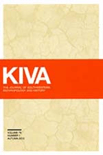
Kiva-Journal of Southwestern Anthropology and History
Fostering Scholarly Dialogue on Southwestern StudiesKiva - Journal of Southwestern Anthropology and History is a distinguished academic journal published by Routledge Journals, Taylor & Francis Ltd, that serves as a vital resource for scholars in the fields of anthropology, archaeology, and history. With an ISSN of 0023-1940 and an E-ISSN of 2051-6177, this journal has established itself as a significant avenue for scholarly communication since its inception in 1964. It consistently ranks in the top quartiles, including Q1 in Archaeology and Q2 in Anthropology, reflecting its high impact and rigorous peer-review process. Covering a wide array of topics pertinent to the Southwestern United States, Kiva invites original research articles, reviews, and methodological papers that advance understanding of the region's rich cultural heritage and historical narratives. While currently not open access, its commitment to disseminating quality research makes it an essential reading for researchers, professionals, and students aiming to explore the multifaceted dimensions of southwestern studies.
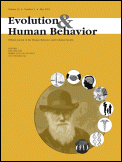
EVOLUTION AND HUMAN BEHAVIOR
Exploring the Interplay of Evolution and Human ActionEVOLUTION AND HUMAN BEHAVIOR, published by Elsevier Science Inc, is a leading interdisciplinary journal that explores the intricate relationships between evolutionary processes, human behavior, and cognition. With an impressive impact factor reflecting its rigorous peer-reviewed content and high citation rates, this journal falls in the prestigious Q1 quartile across multiple categories including Arts and Humanities, Ecology, Evolution, Behavior and Systematics, and Experimental and Cognitive Psychology, solidifying its critical role in advancing research in these fields. Since its inception in 1997 and moving towards 2024, it has consistently provided a platform for innovative research and insights, attracting contributions from a diverse range of disciplines. The journal is accessible through various open access options, ensuring that groundbreaking research is widely disseminated for maximum impact. Researchers, professionals, and students alike benefit from the cutting-edge studies published within, making EVOLUTION AND HUMAN BEHAVIOR an essential resource for those looking to deepen their understanding of the evolutionary context of human actions and interactions.

Metode Science Studies Journal
Fostering Innovative Research in Science StudiesMetode Science Studies Journal, published by UNIV VALENCIA, BOTANICAL GARDEN UV, is an esteemed open-access journal dedicated to advancing scholarly discourse in the fields of history and philosophy of science and multidisciplinary studies. Since its inception in 2013, the journal has positioned itself as a vital resource for researchers, professionals, and students, fostering an environment for innovative research and cross-disciplinary dialogue. Based in the vibrant city of Valencia, Spain, this journal aims to publish high-quality articles that explore the intricate relationships between scientific practices and philosophical inquiries. With a current impact factor demonstrating its relevance in the academic community, the journal is indexed in Scopus, ranking in the 52nd percentile for history and philosophy of science and the 33rd percentile for multidisciplinary studies. Scholars can access a breadth of research outputs that span from 2015 to 2024, thereby contributing significantly to the intellectual landscape of the respective fields.
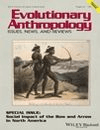
EVOLUTIONARY ANTHROPOLOGY
Connecting Anthropology to the Evolution of HealthEVOLUTIONARY ANTHROPOLOGY is a premier journal published by WILEY, dedicated to advancing the field of anthropology through innovative and rigorous research. With an ISSN of 1060-1538 and an E-ISSN of 1520-6505, this journal boasts a remarkable Q1 ranking in both the Anthropology and Medicine (miscellaneous) categories, reflecting its significant impact within the academic community. Since its inception in 1992, it has continuously evolved, now encompassing a wide array of subjects pertinent to evolutionary studies and human health. Residing in the highly competitive Scopus rankings, it stands at an impressive rank of 10 out of 502 in the field, placing it within the top 2% of journals in Social Sciences - Anthropology. Researchers, professionals, and students alike will find this journal an invaluable resource for the latest findings, theoretical advancements, and discussions that shape our understanding of human evolution and its biological implications. While not categorized as an Open Access journal, EVOLUTIONARY ANTHROPOLOGY remains a vital outlet for high-quality scholarship, fostering dialogue and enriching knowledge across diverse audiences.
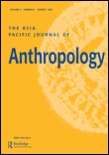
Asia Pacific Journal of Anthropology
Exploring the Rich Tapestry of Asia Pacific CulturesAsia Pacific Journal of Anthropology is a premier academic journal dedicated to advancing the field of anthropology and cultural studies, published by Routledge Journals, Taylor & Francis Ltd. With an ISSN of 1444-2213 and E-ISSN 1740-9314, this journal has gained recognition for its rigorous scholarly contributions since its inception in 2000. Situated in the UK, it is strategically positioned to serve as a vital resource for researchers, professionals, and students exploring the rich complexities of human societies and cultures within the Asia Pacific region and beyond. As evidenced by its Q2 ranking in both anthropology and cultural studies for 2023, alongside its impressive Scopus ranks—#218 among 1304 in Cultural Studies and #157 among 502 in Anthropology—this journal illustrates a strong commitment to delivering high-quality, impactful research. While it is not an open-access journal, it remains a key platform for disseminating innovative research and fostering academic dialogue, thereby significantly contributing to the advancement of knowledge in the social sciences.
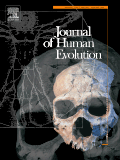
JOURNAL OF HUMAN EVOLUTION
Illuminating Our Evolutionary PathThe JOURNAL OF HUMAN EVOLUTION, published by ACADEMIC PRESS LTD - ELSEVIER SCIENCE LTD, is a premier academic journal focusing on the evolutionary biology of humans and their ancestors. With an esteemed Q1 ranking in the fields of Anthropology and Ecology, Evolution, Behavior and Systematics, this journal is a vital resource for researchers, professionals, and students dedicated to understanding human origins and evolutionary processes. The journal has been steadfastly contributing to the field since 1972, converging knowledge and insights through meticulously peer-reviewed articles. Additionally, it holds an impressive Scopus rank of #12/502 in Anthropology and #105/721 in Ecology, underlining its significant impact and prestige within the academic community. While the journal is not open access, its content remains accessible to those within institutional affiliations, fostering an environment rich in scholarly exchange and innovation. By disseminating cutting-edge research and comprehensive reviews, the JOURNAL OF HUMAN EVOLUTION continues to illuminate the complex narrative of human evolution and is essential reading for anyone engaged in this dynamic field.
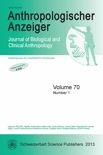
ANTHROPOLOGISCHER ANZEIGER
Fostering Dialogue Between Humans and EcosystemsANTHROPOLOGISCHER ANZEIGER, published by E Schweizerbart'sche Verlagsbuchhandlung, is a distinguished journal dedicated to the interdisciplinary fields of anthropology, animal science, and ecology, with a notable impact on advancing research in these areas. Since its inception in 1971, the journal has played a critical role in providing a platform for innovative research, fostering scholarly exchange, and enhancing the understanding of human and animal interactions and ecosystems. With its current quartile rankings—Q2 in Anthropology and Q3 in Animal Science and Zoology—it is well-positioned to serve as a vital resource for researchers, professionals, and students alike. Although it does not currently offer open access, the journal remains an essential asset for those looking to deepen their knowledge and contribute to ongoing discussions within these intersecting disciplines. For additional information, visit the publisher's office located at NAEGELE U OBERMILLER, SCIENCE PUBLISHERS, JOHANNESSTRASSE 3A, D 70176 STUTTGART, GERMANY.

Antropologia Portuguesa
Innovating Research on Human BehaviorAntropologia Portuguesa, published by COIMBRA UNIV PRESS, is a distinguished open access journal in the field of anthropology, with an ISSN of 0870-0990 and an E-ISSN of 2182-7982. Based out of Coimbra, Portugal, this journal has been a vital resource for researchers and enthusiasts in the anthropological community since transitioning to an open access model in 2012, allowing for broader dissemination and accessibility of knowledge. With its diversified publications spanning from 2011 to 2023, it is well-established within the academic landscape, achieving a Q3 category rank in anthropology as of 2023, and holding a Scopus ranking of #376 out of 502 in the Social Sciences category, placing it within the 25th percentile. The journal aims to foster interdisciplinary dialogue and promote innovative research, offering a platform for the exploration of various anthropological themes and practices. As it continues to contribute to the scholarship in anthropology, Antropologia Portuguesa is an invaluable resource for researchers, professionals, and students committed to understanding cultural dynamics and human behavior on a global scale.